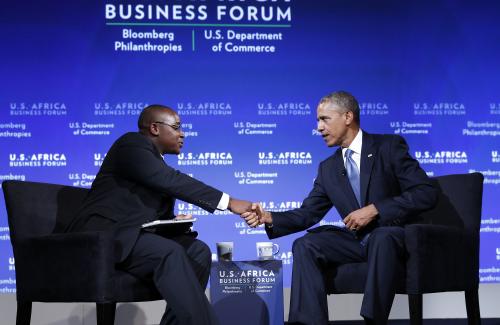Editor’s Note: On September 21, the Department of Commerce and Bloomberg Philanthropies are hosting the second U.S.-Africa Business Forum. Building on the forum in 2014, this year’s meeting again hosts heads of state, U.S. CEOs, and African business leaders, but aims to go beyond past commitments and towards effective implementation. This year’s forum will focus on seven sectors important to African economies and which offer opportunities for investors, namely finance and capital investment, infrastructure, power and energy, agriculture, consumer goods, and information communication technology. The below piece reviews the theme of agriculture as an opportunity for investment on the African continent.
As participants gather for the US-Africa Business Forum, investors should consider one of the most important opportunities for external resources in Africa—the expansion of credit facilities to promote small-scale farm irrigation. Less than 10 percent of the region’s crops are irrigated today, and Africa remains the world’s only region in which most crops are rain-fed. This presents a major roadblock to boosting agricultural productivity, and in turn the “structural transformation” that can ensue through higher on-farm incomes and better off-farm job opportunities.
Irrigation is economically important because it removes a major source of risk—rainfall—from farmers’ investment calculations. For example, if very low-income farmers fear the risk of poor rains then they often won’t borrow money to pay for inputs like fertilizer at the beginning of the season, even if the inputs have high expected returns, because the farmers can’t afford to be indebted if the rains fail. On the other hand, when farmers have reliable irrigation systems, they can more confidently plant crops like fruits and vegetables that offer higher dollar value per hectare than staple crops like maize or cassava. They can also often plant multiple crops per year, even between rainy seasons.
Small-scale irrigation systems typically have a positive expected return on investment. So why is their use in Africa so limited? Apart from the geographic challenge of having few rivers with natural floodplains, most low-income African farmers can’t afford the upfront capital costs to buy and operate irrigation systems, which might cost a few thousand dollars per hectare. Often the local banks don’t have the incentives or capital base to make the needed loans available either.
One of the best things external partners can do, therefore, is invest in private and public incentives (even subsidies) for local banks to scale up access to credit that farmers can deploy toward the most economically and environmentally productive small-scale irrigation systems in their respective geographies. Doing so could prove a major ingredient for a transformation in African agriculture, and in turn a take-off in the region’s long-run economic prosperity.






Commentary
The US-Africa Business Forum: Expanding credit for small-scale irrigation
September 15, 2016